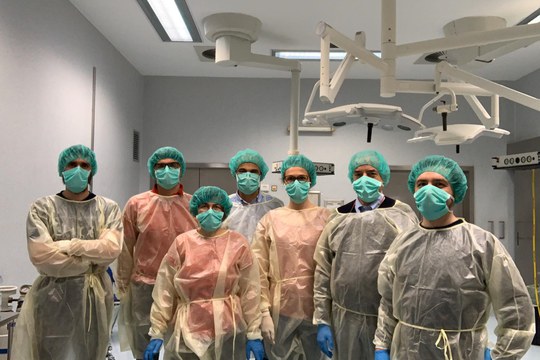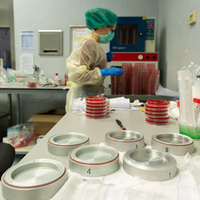The Department of Pharmacy and Biotechnology (FaBiT) is part - together with the Department of Civil, Chemical, Environmental and Materials Engineering (DiCAM) (Prof. Cristiana Boi) and the Department of Medicine and Surgery (DiMeC) (Prof. Francesco Saverio Violante) - of the university task force involved in the verification of newly made surgical masks. Indeed, the Covid emergency has induced many companies to convert their production activity to meet the increased demand for protective aids, which have to be featured by specific technical requirements before being placed on the market. According to the European standards EN14683 and ISO10993 and Istituto Superiore della Sanità (art 34, paragraph 3, Legislative Decree no. 9/2020), these requirements include microbiological tests (bacterial filtration efficiency and total microbial load), and chemico-physical tests (such as resistance to liquid splashes and breathability).
The working group carrying out the microbiological analyses is coordinated by Dr. Martina Cappelletti (RTD B in the Molecular and Applied Microbiology Laboratory of FaBiT) and is composed of Dr. Daniele Ghezzi, Dr. Francesca Borsetti, as well as volunteer students and recent graduates of the Degree Courses in Molecular and Cellular Biology and Molecular and Industrial Biotechnology (UNIBO). The tests are carried out in an operating room in the Hospital Sant’Orsola-Malpighi, which has been promptly transformed into a microbiological laboratory by the working group itself.
The bacterial filtration efficiency (BFE) and the total microbial load (microbial cleanliness or bioburden) are fundamental parameters for defining the effectiveness and safety of a surgical mask, whose purpose is to limit the transmission of agents infectious carried by droplets emitted during breathing and speaking.
Surgical masks are medical devices that play a fundamental role in limiting the spread of the Sars-CoV2 virus and reducing environmental contamination. Their demand is expected to significantly increase at national and global levels during the next weeks and months, when the epidemic situation will allow a gradual return to normality. Until a vaccine and effective therapeutic measures will be developed against Sars-CoV2, social distancing, personal protective equipment and surgical face masks will remain the only possible tools to avoid a new critical spread of contagion.

